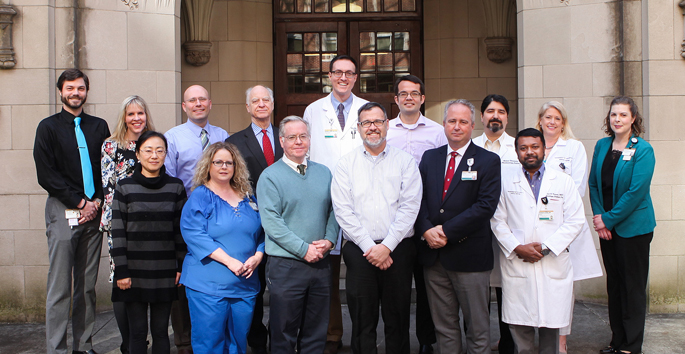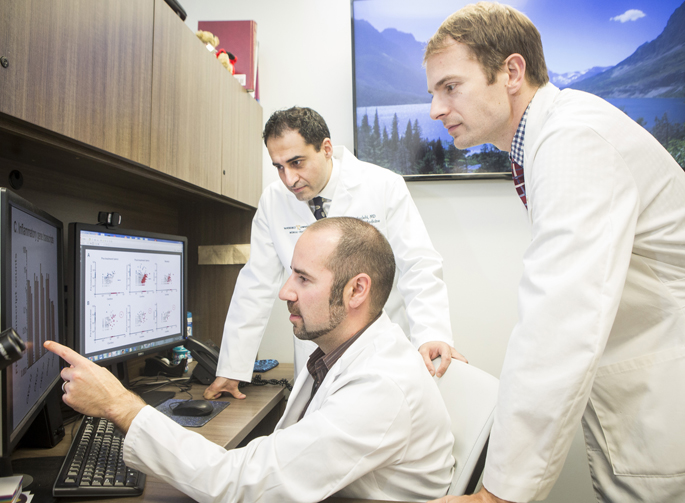New England Journal Of Medicine
-

Stark discusses history’s lessons for AI regulation in ‘New England Journal of Medicine’
The future for AI regulation is currently being charted in the United States and will have significant effects on the health sciences, writes Vanderbilt researcher Laura Stark in a new article published in The New England Journal of Medicine. Read MoreDec 12, 2023
-

Study finds Moderna’s COVID-19 vaccine safe and effective for young children
A Vanderbilt study finds that Moderna’s COVID-19 vaccine is safe and effective in children 6 months to 5 years of age. Read MoreNov 4, 2022
-

Research probes cause of acute flaccid myelitis in children
Research that began at Vanderbilt University Medical Center has found evidence that a viral infection followed by a “robust” immune response is the cause of a polio-like paralyzing illness in children called acute flaccid myelitis (AFM). Read MoreJun 8, 2022
-

VUMC-led study finds Moderna COVID vaccine safe and effective for children
Moderna’s COVID-19 vaccine is safe and generates robust immune responses in children ages 6 to 11 years, a national clinical trial co-led by C. Buddy Creech, MD, MPH, has found. Read MoreMay 12, 2022
-

International study supports dupilumab for treatment of moderate-to-severe asthma in children
In a late-stage clinical trial, the biologic agent dupilumab reduced the rate of severe asthma attacks and improved lung function and asthma control for children ages 6 to 11 with moderate-to-severe asthma, offering a new option to these patients. Read MoreDec 8, 2021
-

Study finds recommended ICU sedatives equally safe, effective
Sedative medications used in intensive care are associated with increased delirium, which is in turn connected with higher medical costs and greater risk of death and ICU-related dementia. Read MoreFeb 2, 2021
-

VUMC studies provide key positive results for COVID-19 vaccine in early-stage clinical trial
An experimental coronavirus vaccine stimulated robust immune responses against SARS-CoV-2, the virus that causes COVID-19, and raised no serious safety concerns in an early-stage clinical trial. Read MoreJul 14, 2020
-

All-in-one pill helps reduce blood pressure, cholesterol
A single pill containing low doses of three medications to treat high blood pressure and one to lower cholesterol reduced the estimated risk of cardiovascular disease by 25%, according to a VUMC study. Read MoreSep 19, 2019
-

All of Us Research Program Takes Aim at Precision Population Health
Scarcely a year after its national launch, the “All of Us” research program, which aims to accelerate the prevention and treatment of disease, has enrolled more than 230,000 research participants — more than a fifth of its recruitment goal of 1 million people. All Read MoreAug 14, 2019
-

Time window extended for some stroke surgeries
New research indicates the time window for a thrombectomy following a stroke is longer than previously thought, but how soon the surgery occurs still matters. Read MoreMar 1, 2018
-

Saline use on decline at Vanderbilt following landmark studies
Vanderbilt University Medical Center is encouraging its medical providers to stop using saline as intravenous fluid therapy for most patients, a change provoked by two companion landmark studies released Feb. 27 that are anticipated to improve survival and decrease kidney complications. Read MoreFeb 27, 2018
-

Team finds stem cell transplant improves scleroderma survival
A new clinical trial by investigators at Vanderbilt University Medical Center (VUMC) and other leading medical centers found that an intensive transplant treatment using the patient’s own stem cells can improve survival and quality of life for patients with advanced scleroderma. Read MoreFeb 15, 2018
-

NEJM Catalyst forum addresses mental, behavioral and social health determinants
Healthcare is more than diagnosing and treating disease. To truly improve health outcomes for individuals and communities, the mental, behavioral and social determinants of health must be fully integrated with physical factors at all levels of the healthcare system. Read MoreJan 29, 2018
-

New lab formulary improves quality, cuts cost
An effort at Vanderbilt University Medical Center (VUMC) to enhance clinical decision making through cross-departmental collaboration and effective use of diagnostics has improved patient care and saved the institution more than $1 million in 2016, VUMC officials reported this week. Read MoreSep 21, 2017
-

New approach for staph-related skin abscesses explored
New multicenter research that includes Vanderbilt University Medical Center (VUMC) investigators, could change treatment approaches to simple skin abscesses, infections often caused by Staphylococcus aureus (staph) bacteria. Read MoreJul 13, 2017
-

Preserving NIH’s Fogarty International Center crucial for global health efforts
This week Douglas Heimburger, M.D., M.S., professor of Medicine at Vanderbilt, joined a growing chorus calling for preservation of the Fogarty International Center of the National Institutes of Health (NIH). Read MoreMay 26, 2017
-

Social risk factors influence outcomes, Medicare payment
Social risk factors including income, education and ethnic background influence health outcomes and should be taken into account in Medicare payment models, according to a New England Journal of Medicine “Perspective” titled “Social Risk Factors and Equity in Medicare Payment.” Read MoreFeb 8, 2017
-

Study finds smaller insurers earning profits in new market
The researchers examine whether the financial struggles of some major insurers under the Affordable Care Act reflect a policy failure or a mismatch of these firms’ capabilities and strategies to a newly created market. Read MoreFeb 2, 2017
-

Automation speeds clinical safety surveillance: study
Using patient outcomes data from approximately 1,800 hospitals, the largest demonstration to date of automated safety surveillance of a medical device is reported in this week’s New England Journal of Medicine. Read MoreJan 26, 2017
-

Study details rare heart risk of certain cancer therapies
Justin Balko, Pharm.D., Ph.D., seated, Javid Moslehi, M.D., left, and Douglas Johnson, M.D., MSCI, review data on rare cardiac side effects linked to cancer immunotherapy combination therapy. (photo by Susan Urmy) Combination therapy using two approved immunotherapy drugs for cancer treatment may cause rare and sometimes fatal cardiac side… Read MoreNov 3, 2016